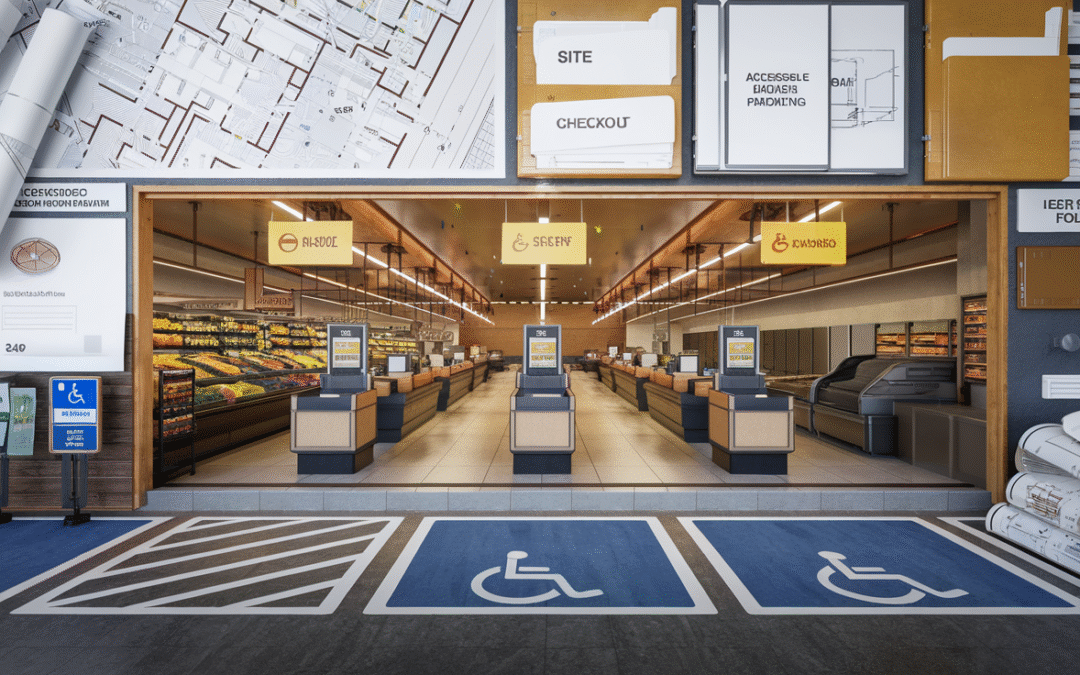ADA Compliance Best Practices for Grocery Store Layouts
Understanding ADA compliance in grocery store design is essential for creating inclusive and accessible shopping environments. For commercial property owners and developers in the San Francisco Bay Area, ensuring that grocery store layouts meet ADA standards not only fulfills ethical and legal obligations but also enhances customer experience and business success. In this guide, we’ll explore the key aspects of ADA compliance in grocery store layouts and how iBuild Design and Construction can help streamline these processes.
Table of Contents
- Understanding ADA Compliance
- The Importance of ADA Compliance
- Key Considerations for ADA Compliance in Grocery Stores
- Successful Implementation of ADA Guidelines
- iBuild’s Approach to ADA-Compliant Grocery Store Design
- Conclusion
- Get Started with iBuild
Understanding ADA Compliance
The Americans with Disabilities Act (ADA) was established in 1990 to eliminate discrimination against individuals with disabilities in all areas of public life, including businesses like grocery stores. Under the ADA, stores must be designed in a way that allows individuals with disabilities to access and navigate the space easily and safely.
The Role of ADA in Retail Spaces
ADA compliance pertains to various aspects of a grocery store, from parking spaces to interior layout. Ensuring these areas comply with ADA standards can expand your customer base and create a more inclusive environment. Key areas that require attention include:
- Accessible parking and entrances
- Aisle width and shelf height
- Checkout counter accessibility
- Signage and wayfinding systems
The Importance of ADA Compliance
For property developers and investors, understanding the importance of ADA compliance extends beyond regulations. ADA-compliant designs improve the store’s reputation, attract diverse customer demographics, and potentially increase revenue. Here are some key reasons for ensuring ADA compliance:
Enhancing Customer Experience
An accessible grocery store offers a seamless and comfortable shopping experience for all customers, including those with disabilities. Wider aisles, lower shelf heights, and accessible restrooms ensure everyone can shop without impediments.
Building Brand Loyalty
Customers appreciate businesses that cater to their needs. By prioritizing accessibility and inclusivity, stores build trust and loyalty with their community, enhancing their reputation and attracting repeat business.
Key Considerations for ADA Compliance in Grocery Stores
To create a grocery store that meets ADA standards, developers and construction managers must focus on specific design elements. These elements ensure that every part of the store is easily accessible to customers with disabilities.
Parking and Entrance Accessibility
At least one in every six accessible parking spaces must be van-accessible with an access aisle. Additionally, store entrances should have ramps or lifts if they are above ground level, providing easy entry without steps.
Aisles and Shelving
Aisles should be a minimum of 36 inches wide to accommodate wheelchairs. Moreover, shelves and displays must be within easy reach of individuals who may have mobility challenges, typically no higher than 48 inches.
Checkout Accessibility
Checkout counters should have at least one lane that’s easily accessible. This lane must offer ample space for maneuvering and have a counter no higher than 36 inches for easy transactions with individuals using wheelchairs.
Restroom and Facility Access
Accessible restrooms are a necessity. They must include features such as grab bars, accessible sinks, and at least one stall with enough space for a wheelchair to turn.
Signage and Wayfinding
Clear, visible signage is crucial for customers with vision impairments. Signage should use large, high-contrast text and symbols and be placed at accessible heights.
Successful Implementation of ADA Guidelines
Implementing ADA guidelines effectively can seem daunting, but success stories highlight the achievable. For example, a recent iBuild Design project involved a major Bay Area grocery chain. By collaborating closely with the client, iBuild reconfigured the store layout to surpass ADA requirements, resulting in increased customer satisfaction and revenue.
iBuild’s architect-led approach ensures seamless collaboration between design and construction phases, eliminating risks of miscommunication and budget overrun, providing clients with a stress-free experience.
iBuild’s Approach to ADA-Compliant Grocery Store Design
At iBuild Design and Construction, our expert team follows a comprehensive approach to ADA compliance, ensuring every project not only meets but often exceeds accessibility standards. Here’s how:
In-depth Site Analysis
Our process begins with detailed site evaluations, assessing every aspect related to accessibility. This step informs the design and construction phases, ensuring no detail is overlooked.
Architectural Precision
Led by seasoned architects like Stepan Berlov, our team creates designs that balance compliance with aesthetic value. Through our architect-led model, design intent is always preserved.
Integrated Design-Build Method
Our integrated approach combines design and construction under one roof, enabling efficient planning and execution. We manage everything—from feasibility studies to final inspections—delivering projects on time and within budget.
Explore how iBuild Design and Construction can facilitate your ADA-compliant grocery store design by visiting our services page.
Conclusion
Achieving ADA compliance in grocery store designs is a vital step for property developers and commercial tenants in the Bay Area. By prioritizing accessibility, you extend your market reach and enhance your store’s inclusivity and appeal. Partnering with experts like iBuild Design and Construction ensures you’ll navigate these requirements smoothly, as our experienced team oversees every detail from design to execution, producing spaces that are not only functional and accessible but also aesthetically pleasing.
Get Started with iBuild
Empower your grocery store project with iBuild Design and Construction’s expertise. Our architect-led process guarantees ADA compliance and superior design outcomes. Ready to discuss your project goals and receive tailored advice? Contact us today to schedule a consultation and take the first step toward a successful, inclusive design.

